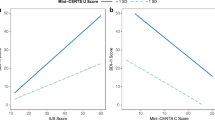Abstract
Thirty nonpsychotic male mental health patients, of whom 15 were diagnosed as having depression according to the Research Diagnostic Criteria, completed three depression inventories and a questionnaire designed to assess attributions and other cognitions. Concern with causality, concern with avoidability, degree of upsetness, globality, the attributional composite, and uncertainty, were found to be positively associated with depression. In general, cognitive features correlated with depression similarly for hypothetical and for stressful events. The correlation between globality and depression was significant for stressful events but not for hypothetical events. Depression correlated significantly with degree of upsetness and concern with causality for hypothetical events but not for stressful events. Uncontrollability, intentionality, and prior expectation of an event's occurrence and recurrence were found not to be associated with depression. Also found to be unrelated to depression was the extent to which the question “What were the causes of this event” was reported to be important. The results for concern with causality and concern with avoidability are interpreted as manifestations of attributional activity, and suggest perhaps that extent of involvement with antecedents of negative outcome events is positively associated with depression. The results also support the hypothesis of a depressive composite attributional style and the hypothesis of greater uncertainty with depression. They confirm a lack of a difference between attributions for real versus hypothetical events.
Similar content being viewed by others
References
Abramson, L. Y., Seligman, M. E. P., & Teasdale, J. D. (1978). Learned helplessness in human: Critique and reformulation.Journal of Abnormal Psychology, 87 49–74.
Beck, A. T. (1976).Cognitive therapy and the emotional disorders. New York: International Universities Press.
Beck, A. T., Ward, C. H., Mendelson, M., Mock, J., & Erbaugh, J. (1961). An inventory for measuring depression.Archives of General Psychiatry, 4 53–63.
Bower, G. H. (1981). Mood and memory.American Psychologist, 36 129–148.
Cochrane, R., & Robertson, A. (1973). The Life Events Inventory: A measure of the relative severity of psycho-social stressors.Journal of Psychosomatic Research, 17 135–139.
Cohen, L., van den Bout, J., Kramer, W., & van Vliet, T. (1986). A Dutch Attributional Style Questionnaire: Psychometric properties and findings of some Dutch-American differences.Cognitive Therapy and Research, 10 665–669.
Dijkstra, P. (1974). De zelfbeoordelingsschaal voor depressie van Zung. In H. M. van Praag & H. G. M. Rooijmans (Eds.),Stemming en ontstemming (pp. 98–120). Amsterdam: De Erven Bohn.
Golin, S., Sweeney, P. D., & Shaeffer, D. E. (1981). The causality of causal attributions in depression: A cross-lagged panel correlation analysis.Journal of Abnormal Psychology, 90 14–22.
Gong-Guy, E., & Hammen, C. (1980). Causal perceptions of stressful events in depressed and nondepressed outpatients.Journal of Abnormal Psychology, 89 662–669.
Gotlib, I. H. (1984). Depression and general psychopathology in university students.Journal of Abnormal Psychology, 93 19–30.
Levitt, E. E., & Lubin, B. (1975).Depression: Concepts, controversies and some new facts. New York: Springer.
Peterson, C., Semmel, A., von Baeyer, C., Abramson, L. Y. & Seligman, M. E. P. (1982). The Attributional Style Questionnaire.Cognitive Therapy and Research, 6 287–300.
Peterson, C., Villanova, P., & Raps, C. (1985). Depression and attributions: Factors responsible for inconsistent results in the published literature.Journal of Abnormal Psychology, 94 165–168.
Schaefer, A., Brown, J., Watson, C. G., Plemel, D., DeMotts, J., Howard, M. T., Petrik, N., Balleweg, J., & Anderson, D. (1985). Comparison of the validities of the Beck, Zung and MMPI depression scales.Journal of Consulting and Clinical Psychology, 53 415–418.
Seligman, M. E. P., Abramson, L. Y., Semmel, A., & von Baeyer, C. (1979). Depressive attributional style.Journal of Abnormal Psychology, 88 242–247.
Spitzer, R. L., Endicott, J., & Robins, E. (1982). Research Diagnostic Criteria.Psychopharmacology Bulletin, 11 22–25.
Sweeney, P. D., Anderson, K., & Bailey, S. (1986). Attributional style in depression: A metaanalytic review.Journal of Personality and Social Psychology, 50 974–991.
Teasdale, J. D. (1983). Negative thinking in depression: Cause, effect or reciprocal relationship?Advances in Behaviour Research and Therapy, 5 3–25.
van den Bout, J. (1986).Verliesgebeurtenissen in attributie-theoretisch perspectief [Loss: An attribution-theoretical perspective]. Delft: Eburon.
van den Bout, J., van Son-Schoones, N., Schipper, J., & Groffen, C. (in press). Attributional cognitions, coping behavior and self-esteem in inpatients with severe spinal cord injuries.Journal of Clinical Psychology.
van Rooijen, L.Enige gegevens over de VROPSOM lijsten voor de bepaling van depressieve gevoelens [Data for the VROPSOM questionnaires for the assessment of depressive affect] (Research Memorandum RM-PS 77-01). Amsterdam: Free University, Department of Social Psychology.
Weiner, B. (1985). “Spontaneous” causal thinking.Psychological Bulletin, 97 74–84.
Wortman, C. B., & Dintzer, L. (1978). Is an attributional analysis of the learned helplessness phenomenon viable?: A critique of the Abramson-Seligman-Teasdale reformulation.Journal of Abnormal Psychology, 87 75–90.
Zautra, A. J., Guenther, R. T., & Chartier, G. M. (1975). Attributions for real and hypothetical events: Their relation to self-esteem and depression.Journal of Abnormal Psychology, 94 530–540.
Zung, W. W. (1965). A self-rating depression scale.Archives of General Psychiatry, 12 63–70.
Author information
Authors and Affiliations
Additional information
The authors are grateful to two anonymous reviewers of an earlier version of this manuscript and to Dr. Steven Hollon, associate editor, for their helpful remarks. This paper is based on findings from a study conducted by authors Groen and Kramer in partial fulfillment of the requirements for thedoctorandus degree in clinical psychology at the University of Utrecht. The authors thank the staff and patients of the Ariënshof Clinic, Bosch en Duin, The Netherlands, for their cooperation and participation. The authors also gratefully acknowledge the work of Frans de Ridder, Caroline Bisschop, and Gerard Krijnen in collecting the data for this study.
Rights and permissions
About this article
Cite this article
van den Bout, J., Cohen, L., Groen, P. et al. Depression and attributional cognitions for hypothetical and stressful events in mental health center patients. Cogn Ther Res 11, 625–633 (1987). https://doi.org/10.1007/BF01176001
Issue Date:
DOI: https://doi.org/10.1007/BF01176001




